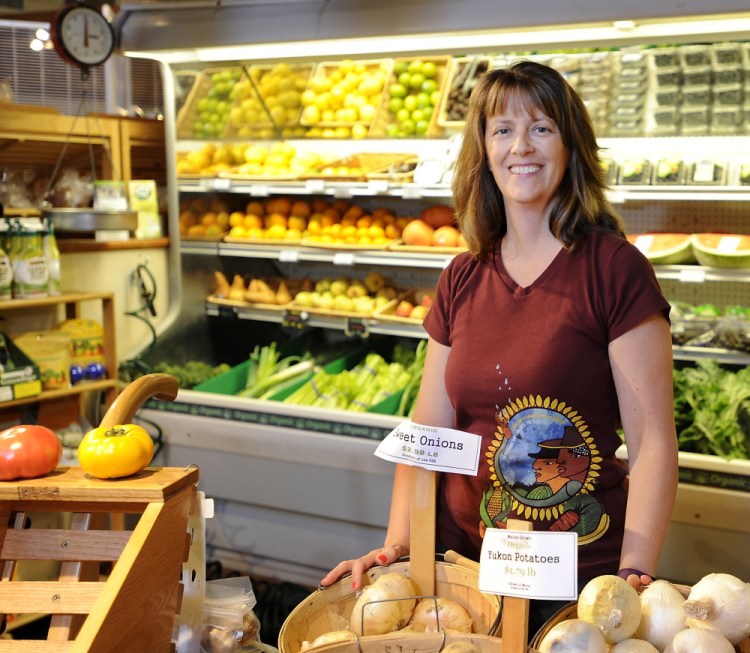Tina Wilcoxson has been involved with natural foods most of her life, assuming you count her childhood on the family potato farm in Limestone. So it may seem preordained that she would come to own Royal River Natural Foods in Freeport.
Wilcoxson is also a champion of the retail world – an honor the National Retail Federation bestowed that last month at its annual meeting in Washington, D.C. She was one of five finalists for the federation’s Retail Champions Award, which honors those retailers who get involved with public policy discussions.
Wilcoxson has owned the store, which has 23 employees, for two years. She got there the old-fashioned way – by working her way up from a minimum wage personal care buyer to owner over a span of 19 years.
Q: How did you get involved in influencing public policy?
A: I’m on the board for the Retail Association of Maine. The main purpose of the association is to keep track of different legislation going on at the state level – anything that would affect retail businesses. It’s a great way to keep track of things like bag fees or the minimum wage. So, I’ve been on that board for about seven years and I’m currently the board chair. Every year, the National Retail Federation has an event to bring retailers to Washington, D.C., and someone nominated me to be a “retail champion,” I think because of my work with the state retail federation. I’m not sure what the requirements were, but I was very surprised and honored.
I’ve been to Washington, D.C., twice to meet with our legislators. Most people that put a bill forward are well-intentioned, but they don’t always know the consequences of that intention. If you don’t tell your story and tell them how it’s like at the real-world level, they’re not going to have the information to make a good decision. You just have to be sincere and honest and say this is how it’s affecting me.
Q: So do you feel you have a good handle on what’s happening?
A: I know what’s going on. If you don’t stay informed it’s hard to have an opinion and decide if something is going to affect you or not. There are so many bills coming up each session that it’s hard to keep track of it on your own. The federation can filter through it all and figure out who’s going to be affected. And if you’re informed, you’re involved.
Q: Does Maine go overboard in regulating small businesses, and retailers specifically?
A: It seems like it’s very similar to other states as far as the number of bills that are brought up. And local rules are starting to be made, so that adds another twist.
Q: Does that tendency of local government to start issuing its own rules – such as Portland’s banning of plastic bags – worry you?
A: It does. It’s a concern for me. I could sit back and say my business isn’t in Portland, so it doesn’t affect me. But it’s much easier to have a level playing field in the state. Also, retailers may own a couple of stores in different communities and it makes it very difficult for them. I’d like to see the minimum wage go up, but it’d be better to have it be at the state level, and not have every community do its own thing. I think sometimes communities get frustrated when there isn’t enough action at the state level and they get tired of waiting.
Q: What are the big issues facing Maine retailers?
A: The minimum wage, just because it’s cropping up in individual towns. I think there were some really good minimum wage bills at the state level, which would have made it easier, and we were disappointed that they didn’t go anywhere. That’s going to be a major issue for businesses in the state and if it comes to a referendum, I’m not sure what the increase will be. It’d be nicer to have a common sense bill go through.
Q: Are you upset that lawmakers didn’t keep their promise to roll the sales tax back from 5.5 percent to 5 percent?
A: I never thought it would go back to 5. We were glad it didn’t go up to 6.5 percent (as it would have under Gov. Paul LePage’s proposed budget), because when you’re bordering New Hampshire, that’s an issue. The main issue were having now is Internet sales don’t have to pay sales tax. That’s huge. If we have someone come in the store and ask us a lot of questions then lose that sale to someone online, it’s very discouraging. There’s some sign of progress. There’s the Marketplace Fairness Act, that’s had mostly Democratic support, but there have been some Republicans (in favor). Sen. (Susan) Collins (R-Maine) is on board for that and so is Sen. (Angus) King (I-Maine). But they’ve had problems getting it through the House. There’s a new bill that gives a little more leeway than previous bills, so we’re hoping that gets passed. That looks pretty good. That’s also a lot of money that the state’s not getting.
Q: Do you get discouraged by politics?
A: I feel better being informed because I know what’s coming and know a little better what to expect. It would be really difficult to be doing this and not be aware. But Maine is a great state for small businesses and people like buying locally, so Maine is great place to be a small, local business owner. We have a lot of Maine state pride.
Send questions/comments to the editors.



